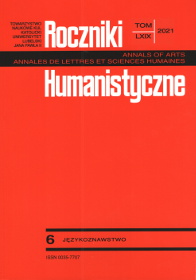Greeting Formulae with Besar ‘Kiss’ in the History of the Spanish Language
Abstract
The aim of this paper is a diachronic analysis of Spanish greeting formulae, understood as pragmaticalised discursive units, specific to the expressive speech act, which serve to establish communication. On the basis of texts from the epistolary discursive genre, the author shows the paradigmatic origin and sociopragmatic factors which determine the use of the predicative greeting formulae with besar ‘kiss’ in the history of the Spanish language.
References
Althoff, Gerd. Die Macht der Rituale: Symbolik und Herrschaft im Mittelalter. Wiss. Buchges, 2003.
Bastús i Carrera, Vicenç Joaquín. Diccionario histórico enciclopédico. Barcelona, Imp. Roca, 1828.
Benveniste, Émile. Problèmes de linguistique générale. Gallimard, 1966.
Bravo, Diana. „¿Imagen positiva vs. imagen negativa?: pragmática socio-cultural y componentes de face”. Oralia: Análisis del discurso oral, 2, 1999, ss. 155-184.
BREPOLIS: Brepolis Publishers. Library of Latin texts, www.brepolis.net/index.html. Dostęp 1.04.2020.
Bresslau, Harry. Handbuch der Urkundenlehre für Deutschland und Italien. Walter de Gruyter, 1958.
Brown, Penelope i Stephen, Levinson. Politeness: Some Universals in Language Usage. Cambridge University Press, 1987.
Camargo, Martin. Ars dictaminis – ars dictandi. Brepols, 1991.
CORDE: Real Academia Española, Corpus diacrónico del español, www.rae.es. Dostęp 1.04.2020.
Cruz Volio, Maria Gabriela. Actos de habla y modulación discursiva en español medieval. Peter Lang, 2017.
Cybulski, Marek. Obyczaje językowe dawnych Polaków: formuły werbalne w dobie średniopolskiej. Wydawnictwo Uniwersytetu Łódzkiego, 2003.
Diewald, Gabrielle. „Pragmaticalization (defined) as grammaticalization of discourse functions”, Linguistics. 49, 2011, ss. 365-390.
Dihle, Albrecht. „Antike höflichkeit und christische Demut”. Studi italiani di filologia classica, 26, 1952, ss. 196-190.
Du Cange, Charles. Glossarium ad scriptores mediae et infimae latinitatis, ducange.enc.sorbonne.fr 1678. Dostęp 1.04.2020.
Faya Cerqueiro, Fátima i Zaida Vila Carneiro. „Análisis pragmático del marcador hola en el teatro de Calderón de la Barca”. Bulletin of Hispanic Studies, vol. 90, 2013, ss. 883-896.
Goffman, Erving. Rytuał interakcyjny. Wydawnictwo PWN, 2006.
Goffman, Erving. Relaciones en público. Microestudios del orden público. Alianza Editorial, 1979.
Gumperz, John. Discourse Strategies. Cambridge University Press, 1982.
Haverkate, Henk. La cortesía verbal: estudio pragmalingüístico. Gredos, 1994.
Hernández Alonso, César. „Ceremonial, cortesía y tratamientos en España a la llegada de los Borbones”. Anuario de lingüística hispánica, vol. 12, 1996, ss. 85-100.
Huizinga, Johann. Jesień średniowiecza. Państwowy Instytut Wydawniczy, 2005.
Jaworski, Adam. „Pragmatic failure in a second language. Greeting responses in English by Polish students”. IRAL - International Review of Applied Linguistics in Language Teaching, vol. 32, 2009, ss. 41-56.
Kabatek, Johannes. „Warum die «zweite Historizität» eben doch die zweite ist – von der Bedeutung von Diskurstraditionen für die Sprachbetrachtung“. Diskurse, Texte, Traditionen Modelle und Fachkulturen in der Diskussion, hrsg. Franz Lebsanft i Angela Schrott, V&R Unipress, 2015, ss. 49-62.
Kerbrat-Orechioni, Catherine. „¿Es universal la cortesía?” Pragmática sociocultural: estudios sobre el discurso de cortesía en español, red. Diana Bravo i Antonio. Briz, Ariel, 2004, ss. 39-54.
Koch, Peter i Wulf Oesterreicher. „Sprache der Nähe–Sprache der Distanz“. Romanistisches Jahrbuch. Band 36, 1985, ss. 15-43.
Lebsanft, Franz. Studien zu einer Linguistik des Grußes. Sprache und Funktion der altfranzösischen Grußformeln. Max Niemeyer Verlag, 1988.
Leech, G. N. Principles of Pragmatics. Longman, 1983.
Lewis, Charlton i Charles Short. A Latin Dictionary. Oxford at the Clarendon Press, 1969.
Líbano Zumalacárregui, Ángeles. „Morfología diacrónica del español: las fórmulas de tratamiento”. Revista de filología española, vol. 71, 1991, ss. 107-122.
Malinowski, Bronisław. „The Problem of Meaning in Primitive Languages”. The Meaning of Meaning: A Study of the Influence of Language upon Thought and of the Science of Symbolism, red. Charles. Ogden i Ivor Richards. Harcourt Brace & World, 1923, ss. 296-336.
Marcjanik, Małgorzata. „Dzień dobry czy dobry wieczór”. Poradnia językowa PWN. sjp.pwn.pl/ poradnia/haslo/Dzien-dobry-czy-Dobry-wieczor;6906.html. Dostęp 1.04.2020.
Moreno, Cristobalina. „The Address System in the Spanish of the Golden Age”. Journal of Pragmatics, vol. 34, 2002, ss. 15-47.
Nowikow, Wiaczesław. „Sobre los modelos etológicos-lingüísticos”. El enfoque social y cultural en los estudios lingüísticos y literarios, red. B. Łuczak, i in. Embajada de España, 2003, ss. 155-162.
Penn, Michael. Kissing Christians: Ritual and Community in the Late Ancient Church. University of Pennsylvania Press, 2013.
Searle, John. Expression and Meaning: Studies in the Theory of Speech Acts. Cambridge University Press, 1979.
Zgółkowa, Halina i Tadeusz Zgółka. Językowy savoir-vivre. Kantor Wydawniczy, 1992.
Zieliński, Andrzej. Las fórmulas honoríficas con -ísimo. Contribución a la lexicalización de la deixis social. Peter Lang, 2017.
Zieliński, Andrzej. „Las fórmulas de saludo en polaco y en español”. Romanica Cracoviensia, vol. 18, 2018, ss. 105-114.
Zieliński, Andrzej. „Hacia una tipología de las fórmulas de saludo en la historia del español”. Pragmática sociocultural, vol. 7, 2019, ss. 1-25.
Zieliński, Andrzej. „Origen y evolución de las fórmulas de saludo con besar en español”, Studia Romanica Posnaniensia, vol. 47, 2019, ss. 17-27.
Copyright (c) 2021 Roczniki Humanistyczne

This work is licensed under a Creative Commons Attribution-NonCommercial-NoDerivatives 4.0 International License.





